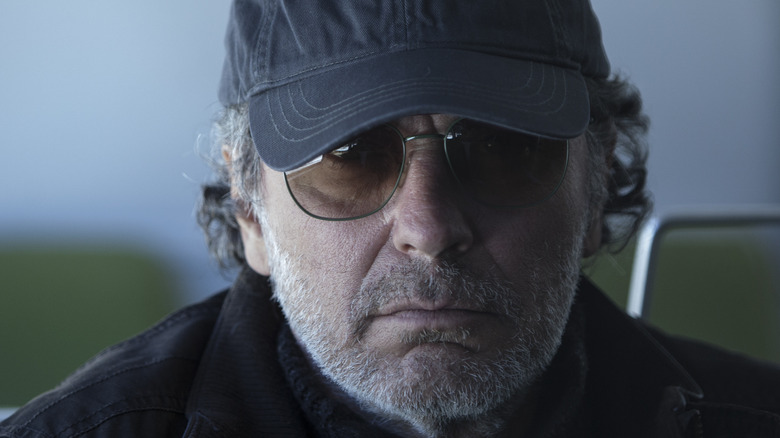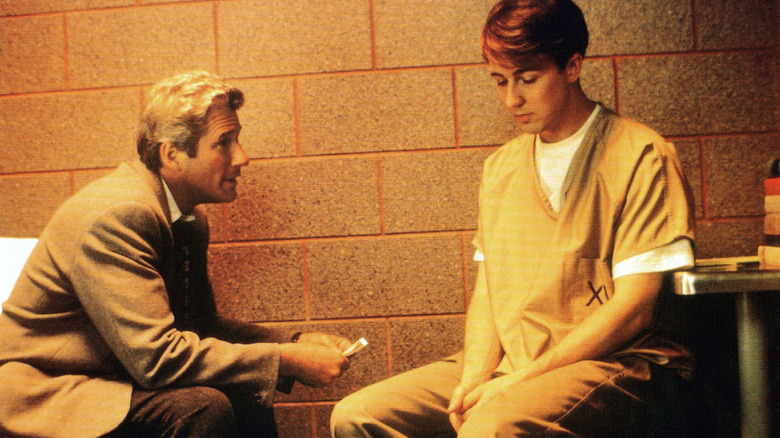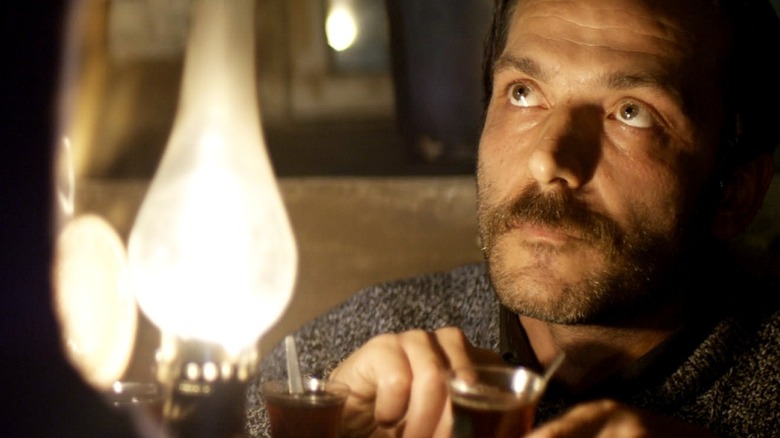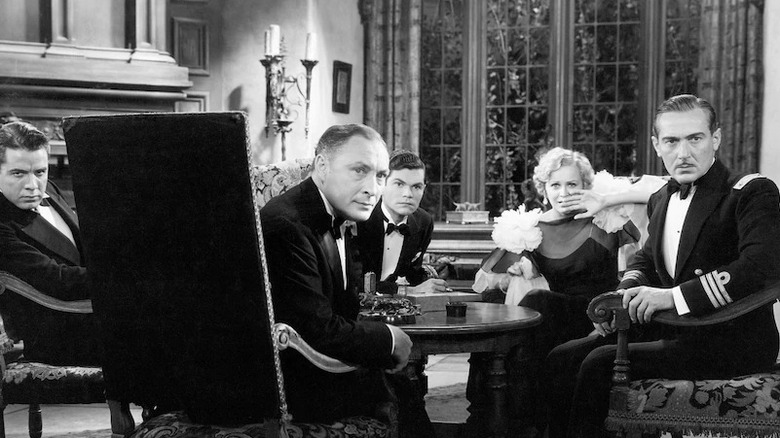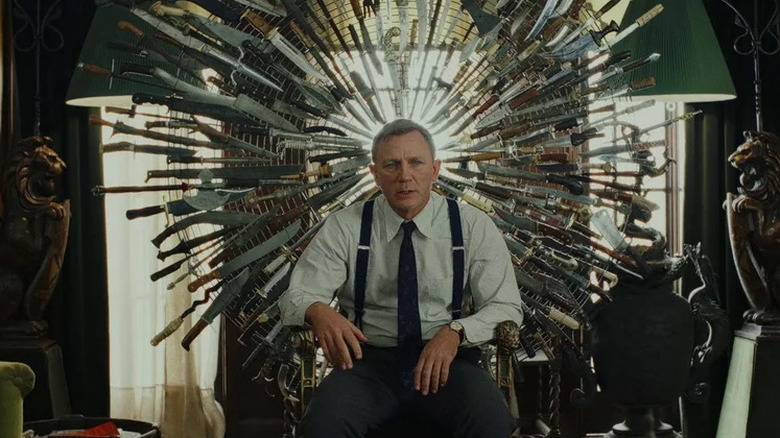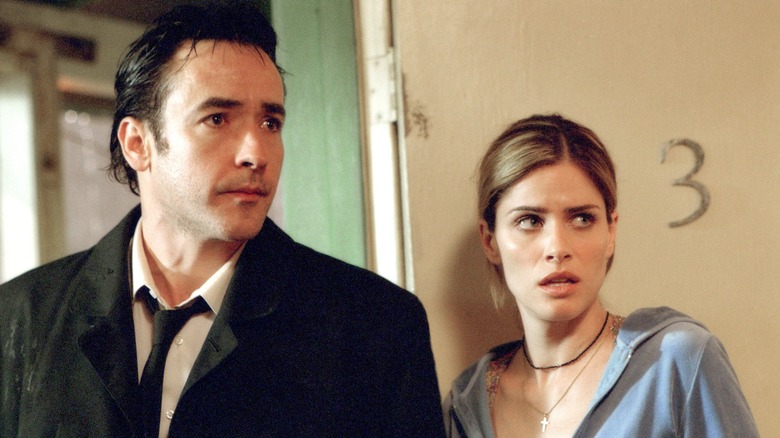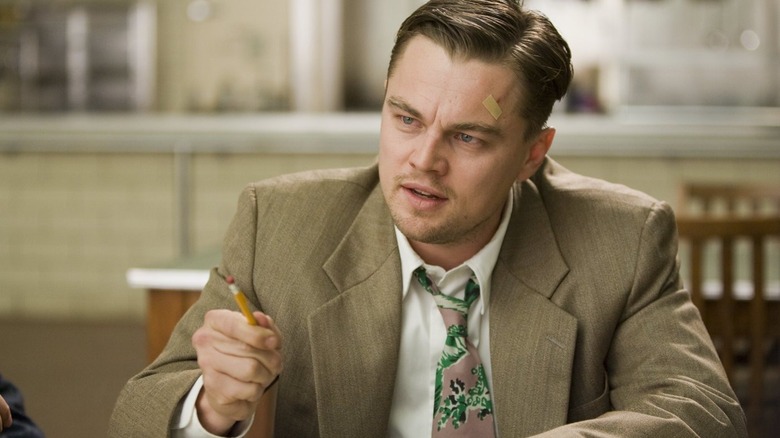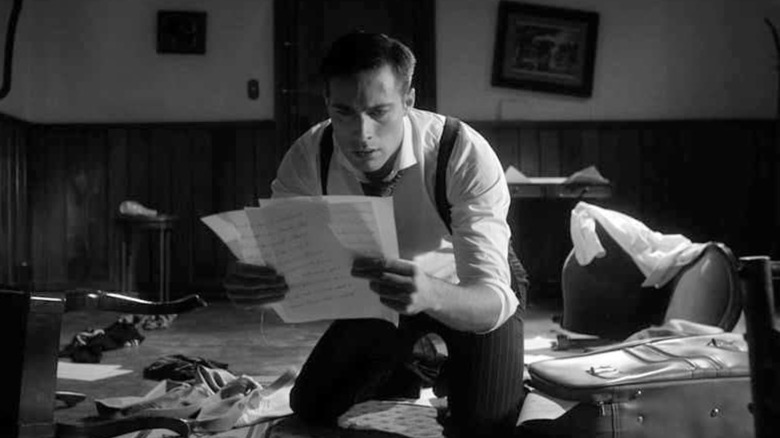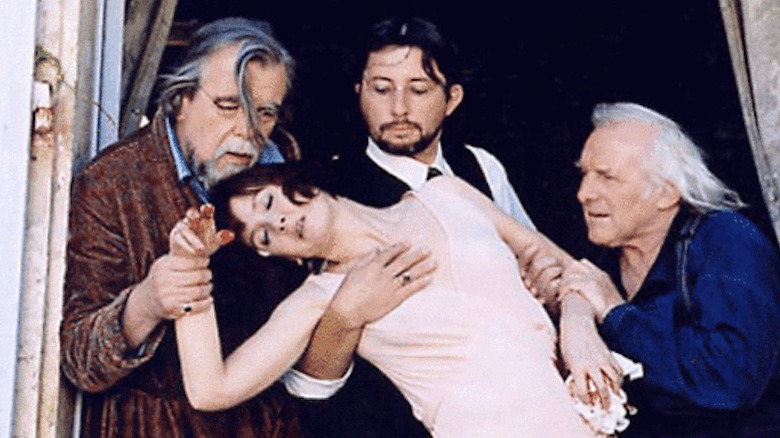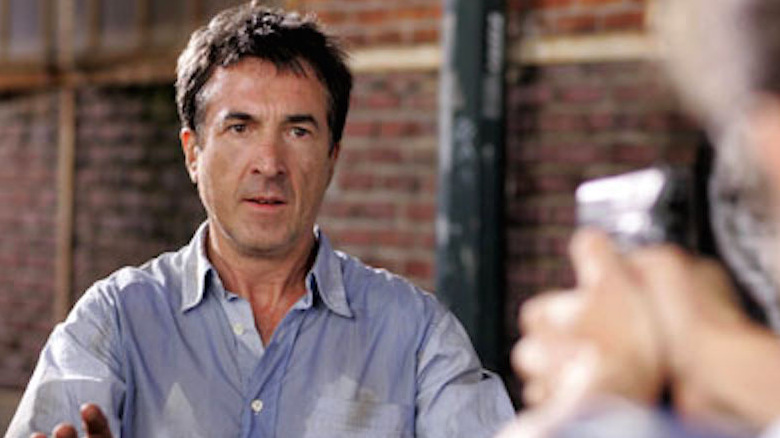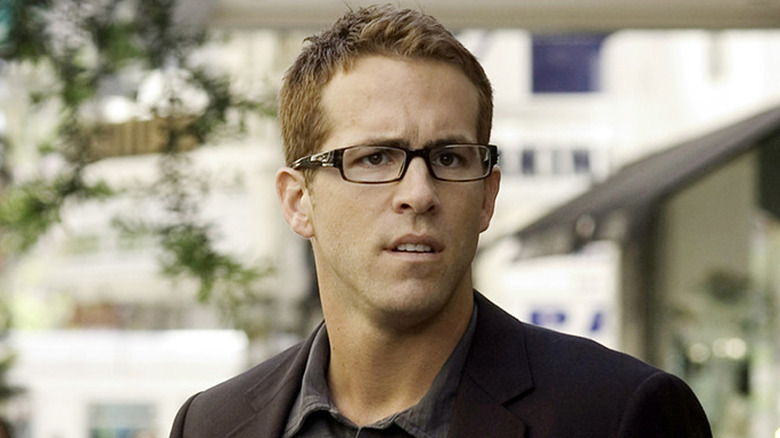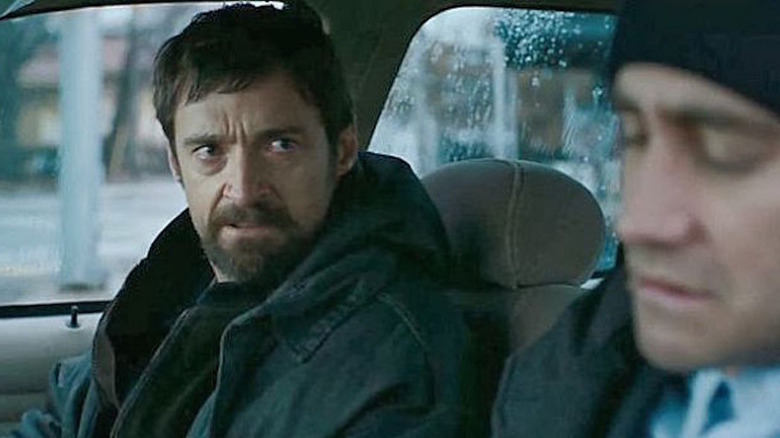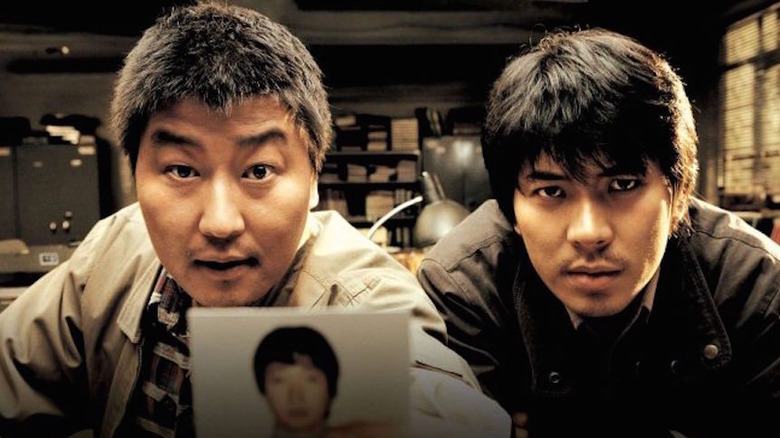12 Awesome Movies Like The Invisible Guest That Fans Need To Watch Next
The Spanish thriller "The Invisible Guest" broke through at the box office in 2016 by virtue of its complex, seemingly foolproof plot: A man (Mario Casas) is accused of murdering his lover (Barbara Lennie) after being found unconscious in a locked room with her body.
Determined to prove his innocence, he retains a high-powered attorney (Blanca Martinez) to root out the truth behind the crime. Viewers were sucked in by the intricacy of director Oriol Paulo's intricate script, revealing the events leading up to and during the murder before pulling the rug out from under them with a memorable final twist.
If you're among those still grappling with the revelations in "The Invisible Guest," and crave more baffling and compelling thrillers, here's a watch list for you. Included below are big hits and little-known sleepers from Hollywood, Europe, Asia, and other points on the globe, each quietly packing a punch (or more) in their plotting. If you're ready for more surprises (and heavy spoilers), read on for a dozen movies "Invisible Guest" lovers should watch next.
Primal Fear (1996)
Much of the buzz around "The Invisible Guest" hinges on a string of shocking revelations that upend what the characters (and the audience) understand about the film's central crime: the murder of a woman inside a locked room. The twist in the movie's tail brings to mind 1996's "Primal Fear," which earned an immediate buzz among suspense for its own jaw-dropping conclusion.
Richard Gere stars in this late '90s legal thriller as a defense attorney assigned to defend a teenage boy (Edward Norton, in his Oscar-nominated film debut) accused of murdering a well-loved Chicago archbishop. As he delves into the case, Gere discovers that Norton's character houses two personalities: a mild-mannered boy with a speech impediment and a violent, amoral killer. Declared not guilty by reason of insanity, the freed boy reveals a Machiavellian deception.
Much of the success of the film's twist ending was due to Norton's carefully calibrated, spine-tingling performance, which played a major role in launching his career.
Once Upon a Time in Anatolia (2011)
At first blush, "The Invisible Guest" doesn't seem to have a lot in common with the 2011 Turkish-Bosnian drama "Once Upon a Time in Anatolia." The former is a complex thriller filled with moments of high drama and violence, and the latter is a lengthy (over two-and-a-half hours), slow-paced meditation on life, death, and the meaning of existence. However, the two films share similar strands of plot DNA, particularly in how the smallest detail can change how we understand the world around us — for better or worse.
Director Nuri Bilge Ceylan — who earned a shared Grand Prize from the Cannes Film Festival for the film — follows a caravan of stern-faced men (police, grave diggers, and a doctor) across a bleak landscape in Anatolia, the huge West Asian peninsula that encompasses much of Turkey. They are looking for a body, but the culprit can't remember where he buried it. They stop many times in the search, and each visit or person they encounter expands their (and our) understanding of both the crime and the emotions exposed by a sudden, tragic death. "Anatolia" covers a much more complex canvas of experience than "Invisible Guest," but both share a remarkable skill at exploding the viewer's perspective, one element at a time.
The Secret of the Blue Room (1933)
"The Invisible Guest" is a textbook example of what suspense fans know as a "locked-room mystery," detailing a crime that takes place under what seems like impossible circumstances. Edgar Allan Poe helped lay the groundwork for the subgenre with his "Murders in the Rue Morgue," which concerns two brutal killings that occur in a room locked from the inside.
The premise has since been used in countless works of fiction (Agatha Christie's "Murder on the Orient Express," Stieg Larssen's "The Girl with the Dragon Tattoo") and movies, including "The Invisible Guest." One of the earliest examples of a locked-room mystery in film is "The Secret of the Blue Room," which Universal Pictures released in 1933.
Based on a 1932 German film of the same name, "Blue Room" concerns a trio of romantic rivals vying for the hand of Gloria Stuart (of "Titanic" fame). Her father decides that the man who will win her affection is the one who survives a night locked in the titular room, where three previous guests have died. True to form, the first two hopefuls meet mysterious fates, leaving Paul Lukas to uncover the room's deadly secret. Directed by Kurt Neumann, who later helmed the sci-fi classic "The Fly," and filmed using sets from James Whale's horror classic "The Old Dark House," "Secret" has twists to spare, a clever payoff, and enough spooky atmosphere to hold the attention of modern horror fans.
Knives Out (2019)
Released the same year as "Invisible Guest," Rian Johnson's Oscar-nominated "Knives Out" was also built upon the foundation of a murder behind closed (if not locked) doors, as well as a small army of schemers and double-crossers with reasons to want wealthy patriarch Christopher Plummer dead. The tone is clearly different — "Knives Out" aims for the same sort of morbid good cheer as Peter Ustinov's turns playing Hercule Poirot (like in 1978's "Death on the Nile"), the Anthony Perkins/Stephen Sondheim-written "The Last of Sheila" or even Margaret Rutherford's '60s-era adventures as Miss Marple.
"Invisible Guest" offered a much darker take on locked-room touchstones, but both approaches are successful for their respective filmmakers. "Knives Out" netted a sizable box office return and Golden Globe nods, among many other laurels, and even generated multiple Netflix-produced sequels, including "A Glass Onion." "Invisible Guest" was also a commercial success and led to four remakes, including two Indian features and most recently, a Korean adaptation titled "Confession."
Identity (2003)
This early labyrinthian 2000s thriller was something of a dud at the box office; a shame, since it is clever, well-performed, and genuinely surprising.
An intricately-plotted thriller with a devastating final reveal, James ("Logan") Mangold's 2003 film "Identity" presents what appears to be, at first, two parallel stories: A psychiatrist (Alfred Molina) and defense attorney debate the use of secret journals kept by serial killer Pruitt Taylor Vince as evidence of insanity, and a group of ten strangers are stranded at a rundown motel stalked by an unseen killer. How the two plot threads link together to present a very disturbing reality is key to this under-appreciated film's appeal.
Like "Invisible Guest," the viewer's understanding of the crimes is filtered through various perspectives. In this case, it's more than a dozen, from Molina and Pruitt to John Cusack, Ray Liotta, and Amanda Peet as members of the ten (little Indian) travelers fighting for their lives at the motel. "Identity" slowly tips its hand as to who— or what — is going on, but it's not until the film's final moments that the awful truths are revealed, leading up to a chilling final answer.
Shutter Island (2010)
The stunning reveal at the end of "Invisible Guest" echoes the astonishing surprise endings of films like "The Sixth Sense" and "The Usual Suspects." Another suspenseful picture that presents viewers with a character that proves beyond what viewers believe them to be is Martin Scorsese's 2010 psychological chiller "Shutter Island," based on a novel by Dennis Lehane.
Leonardo DiCaprio stars as a detective in 1950s-era Boston, on the hunt for a woman who murdered her three children. His search brings him to the titular island, on which resides a hospital for the criminally insane. DiCaprio — whose character struggles with mental trauma from his experiences in World War II and the death of his wife — questions the facility's staff and patients, and is drawn into allegations of forced operations, mind control experiments, and even shifts in reality. When pressed on the whereabouts of his partner (Mark Ruffalo), psychiatrist Ben Kingsley calmly informs DiCaprio that he arrived on Shuttle Island alone. Reality finally fragments completely to unveil the truth about the investigation, the missing woman, and DiCaprio himself, pushing the film into nightmarish territory.
Dead End (2018)
The locked-room mystery at the heart of "Invisible Guest" has a long history, and has been the impetus for numerous films, but the 2018 Spanish flick "Dead End" is unique in how it invites the viewer to investigate a locked-room scenario from both the literary and the cinematic perspectives.
The investigator at the heart of the film is a mystery writer (Osmar Nunez) who has authored a string of Sherlock Holmes-like novels; having completed a new manuscript about a murder in a locked room, the author is dismayed to discover that another writer (Marie Eugenia Rigon) has been killed in a manner almost identical to the details in his story. The possibility of a copycat is impossible, because Nunez's story is unpublished, so in turn he becomes the lead suspect.
The author is forced to rely on skills of deduction to clear his name, but as a literary critic notes, Nunez has never provided satisfying resolutions to his mysteries. Writer-director Daniel de la Vega plays homage to several different forms of movie mysteries, from silent serials to the hyper-violent Italian giallo, draping his mystery in noirish shades of black and white
The Mystery of the Yellow Room (2003)
As locked-room mystery novels go, few are as highly praised as Gaston Leroux's 1907 tome "The Mystery of the Yellow Room." Leroux — perhaps best known as the creator of the Phantom of the Opera — conceived a baffling mystery with a sort of interactive component (in diagrams and floor plans of the story's location) to draw the reader into solving the central crime. Fellow authors such as Agatha Christie and locked-room specialist John Dickson Carr praised Leroux's intricate novel, which has since been adapted numerous times as a stage play, radio drama, and a film on six different occasions by French, American, and Argentine directors.
The most recent film adaptation of "The Mystery of the Yellow Room," directed in 2003 by French filmmaker Bruno Podalydes, follows the basic text, with a trio of investigators delving into how the daughter of a professor (Michael Lonsdale of "Moonraker") could have been taken down by a gunshot wound in a room locked from the inside. While the tone is quite lighter than that of "Invisible Guest," and Podalydes gently tweaks the pomposity of authority figures and the manners and customs of the early 20th century, the mystery itself remains an engrossing puzzle, retaining the ability to dazzle viewers during the final reveal.
Tell No One (2006)
One of the chief thrills of watching "Invisible Guest" is the way the film's plot slowly peels back the corners of what the audience has come to believe about the crime, revealing reveals a completely different set of facts. That rush of realization is also sown throughout the 2006 French thriller "Tell No One," which presents viewers with an irrefutable fact — the wife (Marie-Josee Croze) of psychiatrist Francois Cluzet has been murdered by a serial killer — then proceeds, with slow but inevitable determination, to invert every fact surrounding the case.
Cluzet is still recovering from his wife's murder when his life falls into chaos; he's accused of a double homicide, despite having no knowledge of the crimes. Things get increasingly more strange and frightening, with an email arriving from his dead wife and attacks on friends to silence them from talking about Cluzet, culminating in a murder. Cluzet knows his wife is dead — he has seen the post-mortem photos — and yet she's soon appearing in person. What is the truth about her murder? And who's responsible? Like "Invisible Guest," "Tell No One" presents what seem like impossibilities, then astonishes by deftly showing them to be absolute facts.
The Nines (2007)
One of the overarching messages of "Invisible Guest" is that things are not as they seem. That premise carries a great number of movies, from suspense-thrillers like "The Manchurian Candidate" to epic sci-fi adventures like "The Matrix." And while "Invisible Guest" is rooted in the real world, it does allow the viewer to consider a number of different realities, each involving the same core characters. In that way, it shares some DNA with the largely overlooked Ryan Reynolds drama "The Nines."
Written and directed by John August, who penned the screenplays for "Charlie's Angels" in 2000 and several Tim Burton features ("Corpse Bride," "Dark Shadows"), "The Nines" is broken into three segments, each starring Reynolds in a different (and very serious) role. He's an actor under house arrest, then a TV writer pitching a show for Melissa McCarthy (who plays herself), and finally, a video game designer stranded with his family. Though all different in terms of plot, each of the episodes is linked in various ways that require deciphering by the viewer. The final payoff is far afield of the reveal in "Invisible Guest" — it's far more cosmic — but still packs a disorienting punch.
Prisoners (2013)
A need for revenge boils at the heart of "Invisible Guest"; it's the engine that fuels the intricate unraveling of Adrian's plot by the parents of Daniel Garrido, who suffers an ugly death due to his heartless, self-centered ways. Revenge is also the motivation for terrible deeds in 2013's "Prisoners," which offers enough alarming twists to rival those in "Invisible Guest."
The film, directed by Dennis Villeneuve ("Dune"), stars Hugh Jackman as the father of a small town girl who disappears during a holiday visit with neighbors (played by Viola Davis and Terrence Howard). A young man (Paul Dano) with intellectual disabilities is questioned by a local detective (Jake Gyllenhaal), but has no apparent connection with the missing girl. Jackman refuses to accept that Dano is innocent and holds him captive in his basement, where he and Howard torture him in order to obtain a confession. Meanwhile, Gyllenhaal digs deeper into the case, uncovering a number of unpleasant truths about members of the community.
A challenging viewing experience with a turn by Jackman that's miles away from his heroic screen persona, "Prisoners" shares the bitter taste of discovering horrible secrets with "Invisible Guest," as well as the all-consuming nature of revenge. Both films see some kind of justice meted out for their respective crimes, but the price that everyone pays for "solving the case" only compounds the misery.
Memories of Murder (2003)
For his second feature film, director Bong Joon-ho drew inspiration from the crimes of a real-life serial killer who haunted the city of Hwaseong in the late 1980s and early '90s, evading capture until 2019.
The 2003 film "Memories of Murder" concerns the search for a similar killer and the frustration experienced by the police, leading to even more mayhem and death. Bong's frequent leading man, Song Kang-ho, stars as a small town detective who believes he can determine a person's guilt by looking into their eyes. His methods are challenged throughout the film by the elusiveness of the killer, a string of failed suspects, and ultimately, his own shortcomings as an investigator.
Threads of plot elements connect "Memories" with "Invisible Guest." Both focus on a seemingly unsolvable crime which requires a specialist to untangle (in "Memories," it's a big city detective played Kim Sang-kyung, while in "Invisible Guest," it's high profile lawyer Bianca Martinez). Overconfidence in their own skills causes both Song Kang-ho and Mario Casas' Adrian Doria to fall swiftly from their own high perches, and mistaken identities flourish. "Memories" is loaded with red herrings, from the mentally disabled Baek (Park No-shik) to factory worker Park (Park Hae-il). All seem at some point to be the solution to the case, just as Adrian's plan seems to solve his problem. Yet in both cases, what appears to be the truth crumbles away, revealing the polar opposite.
